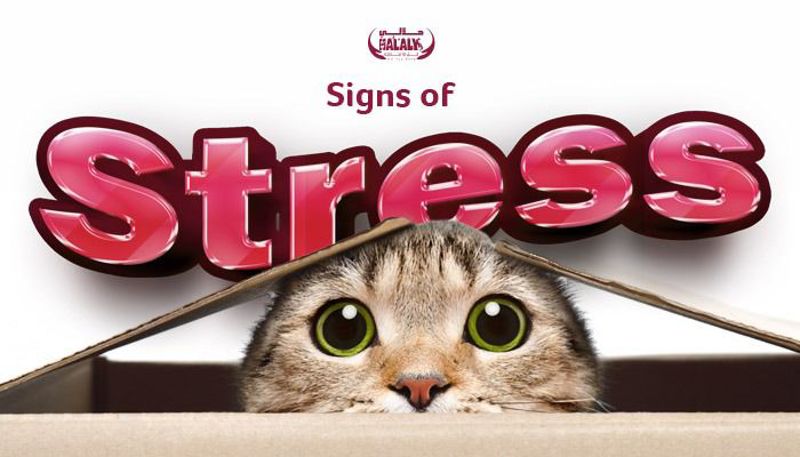Cats, independent and mysterious creatures, are the closest animals to us.
As cat lovers, we love their strange behaviors, like how they curl up beside us or quietly observe the world from a sunny spot.
Stress affects cats in the same ways that it affects humans, as they are sensitive creatures. The difference? They can't tell us when they're feeling anxious or overwhelmed. Recognizing signs of stress in cats is essential to keeping them healthy and happy. This blog will explore common symptoms, potential causes, and ways to help your cat feel more comfortable.
Common Cat Stress Symptoms
It’s easy to miss the subtle signs of stress in cats, but once you know what to look for, you'll be ready to help your cat. Here are some of the most common cat stress symptoms:
-
Changes in Appetite: If your cat suddenly eats more, less, or even stops eating altogether, stress could be the reason. Any sudden changes in their eating habits should be taken seriously.
-
Litter Box Problems: Cats are creatures of habit, especially when it comes to their litter boxes. A stressed cat may start going outside the litter box, signaling that something is off.
-
Excessive Grooming or Lack of Grooming: Some cats will over-groom themselves causing bald spots, while others may stop grooming entirely. Both behaviors can be signs of underlying stress.
-
Hiding: Does your cat suddenly spend more time under the bed or in closets? While cats enjoy their alone time, excessive hiding can be a clear sign of anxiety.
-
Aggression or Fearfulness: Cats under stress may act out, becoming more aggressive or unusually fearful. You might notice more hissing, scratching, or even avoiding contact with people they usually enjoy being around.
-
Increased Vocalization: If your cat is meowing loudly or yowling more than usual, it could be their way of letting you know something is wrong. Stress often leads to vocal outbursts, even in quiet cats.
-
Changes in Sleep Patterns: While cats are famous for their long naps if your cat is sleeping more than usual or seems restless, stress might be the reason.
What Causes Stress in Cats?
Now that we've identified the signs, let’s discuss what might be causing your cat's stress. Understanding the root of the problem is key to helping them feel better.
-
Environmental Changes: Cats stick to a routine. Moving to a new house, rearranging furniture, or introducing a new pet can easily throw them off balance and cause stress.
-
Boredom or Lack of Stimulation: Cats like to engage their minds and bodies. Without toys, climbing spaces, or a window view, they become bored, leading to stress.
-
Health Problems: Sometimes, stress is linked to discomfort or pain. An underlying health issue can make your cat anxious, so it's always worth checking with a vet if your cat shows signs of stress.
-
Conflicts with Other Pets: In multi-pet households, competition for resources like food or litter boxes can cause stress. Cats are notoriously territorial, and any disruptions in the hierarchy can lead to anxiety.
-
Loud Noises or Routine Changes: Cats are highly sensitive to their surroundings. Sudden loud noises, like fireworks or construction noises, or even a change in their daily routine, can trigger stress.
How to Help Your Stressed Cat
Once you've recognized the signs and pinpointed potential causes, the next step is to help your cat feel more comfortable. Here are some practical tips:
-
Create a Safe Space: Give your cat a quiet spot where they can retreat when they're feeling stressed. A cozy bed in a quiet corner or a hidden spot in the house can offer them a sense of security.
-
Use a Cat Stress Diffuser: Consider using a cat stress diffuser, which releases calming pheromones to create a soothing environment. This can be particularly helpful in multi-cat households or during big changes like moving.
-
Engage in Play: Regular playtime is essential for reducing stress. Toys that tap into their natural hunting instincts, like feather wands or laser pointers, can be effective stress relievers. Puzzle toys that release food can also provide mental stimulation.
-
Stick to a Routine: Cats feel safest when they know what to expect. Keeping feeding times and daily activities consistent helps maintain a sense of normalcy.
-
Dietary Adjustments: Did you know your cat's food can help manage stress? There are types of stress cat food, formulated with calming ingredients like tryptophan. Talk to your vet about whether this could be a good option for your cat.
Preventing Stress in Cats
Preventing stress is always better than dealing with its effects. Here are some ways you can proactively reduce stress in your cat’s life:
-
Environmental Enrichment: Provide your cat with plenty of things to keep them busy, like scratching posts, climbing trees, or window perches. Offering them opportunities to explore and play will keep them happy and stimulated.
-
Gradual Changes: If you're planning to introduce a new pet or make changes to your home, do so slowly. Give your cat time to adjust to the new surroundings or routine without feeling overwhelmed.
-
Regular Vet Check-Ups: Keeping up with your cat's health is crucial. Regular vet visits can help catch any issues early before they become a source of stress.
Summing-up
Recognizing the signs of stress in cats is an important part of being a caring and responsible cat owner. Changes in behavior, like hiding, over-grooming, or refusing food, can be your cat’s way of telling you they’re stressed.
By understanding these signals and addressing the root causes, you can help your cat feel more relaxed and secure.























































